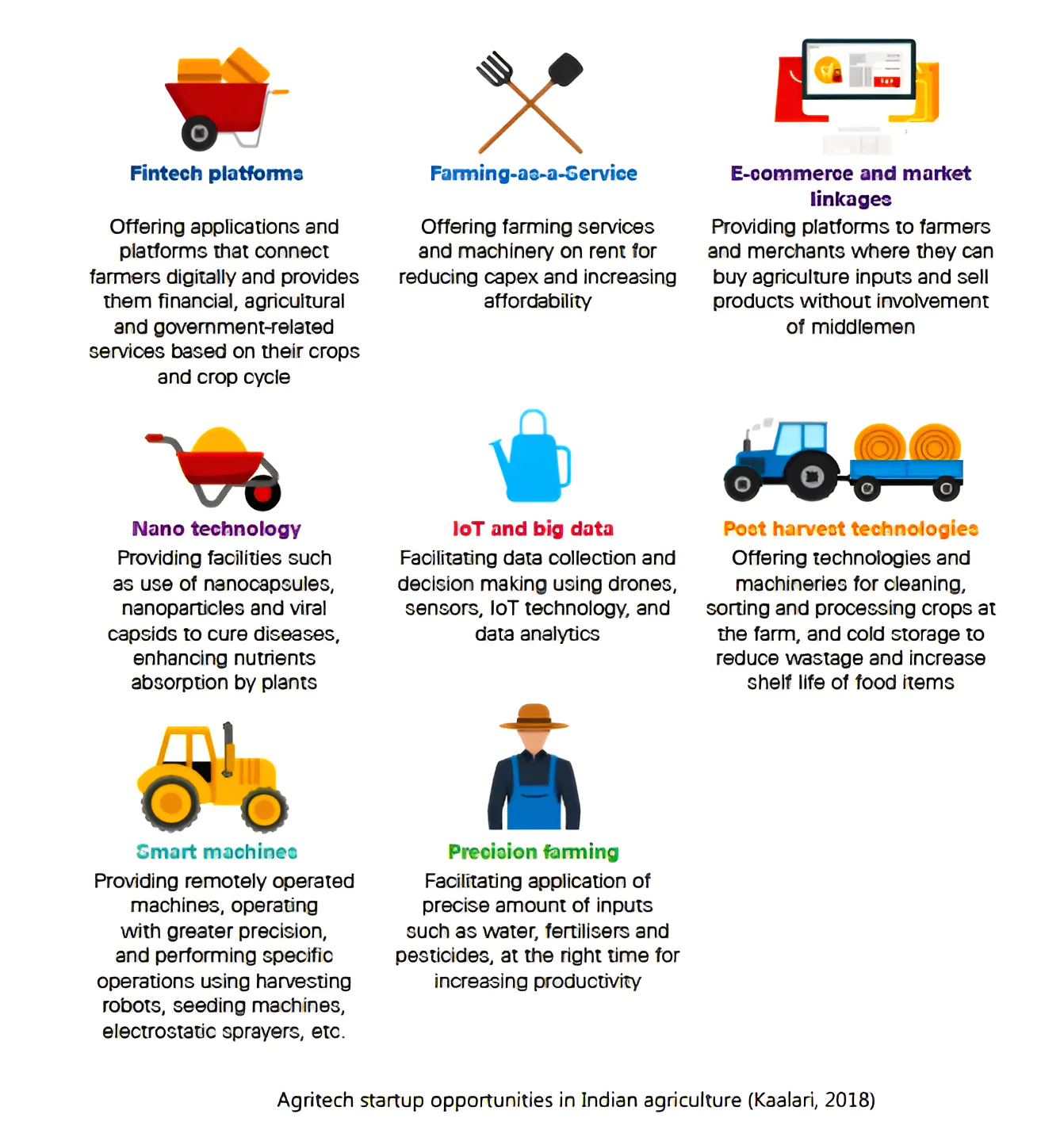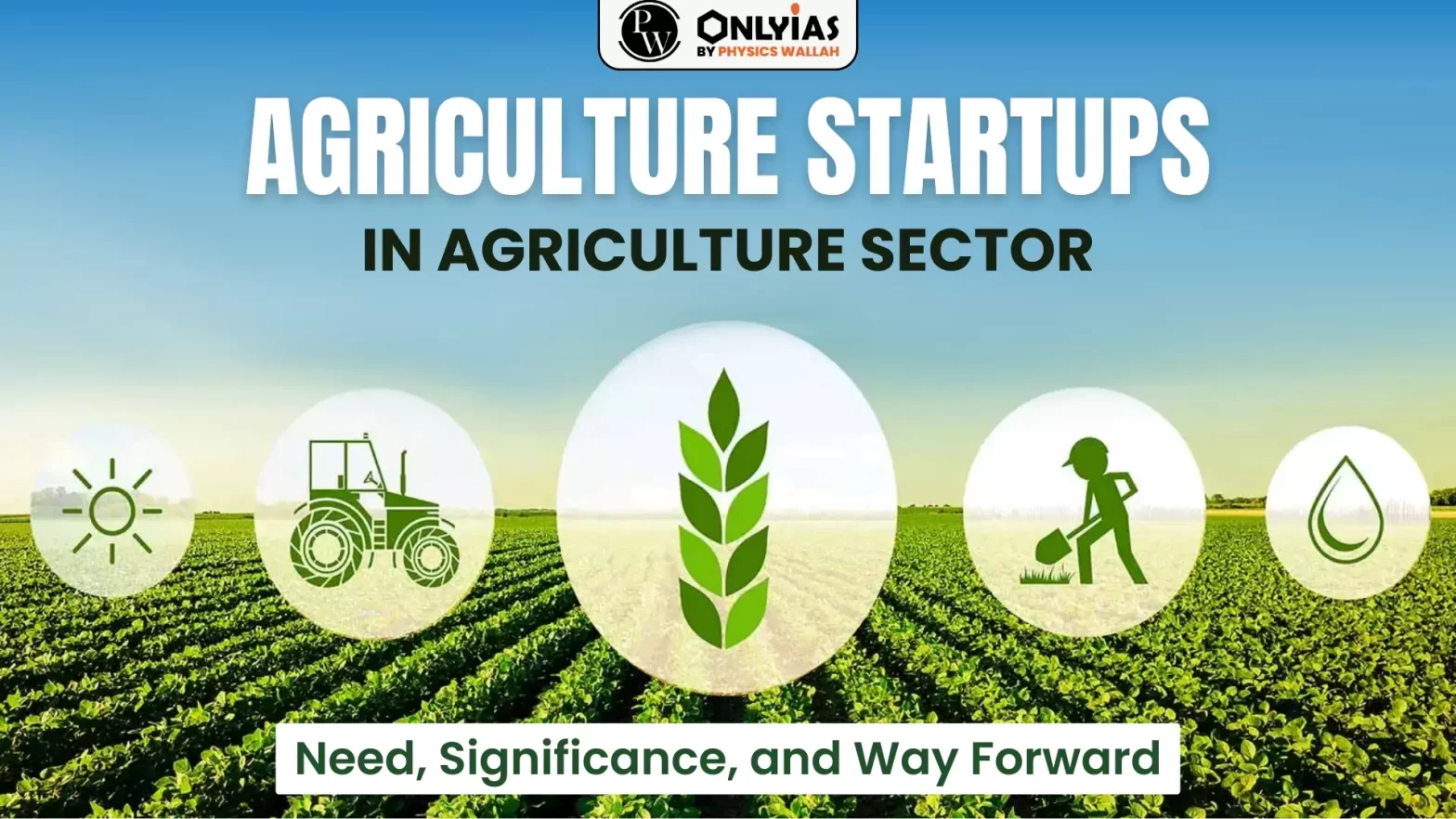Context:
This article is based on the news “PROMOTION OF STARTUPS IN AGRICULTURE SECTOR” which was published in the Pib. Dept of Agriculture and Farmers Welfare is implementing the “Innovation and Agri-Entrepreneurship Development” program.
- The objective of the program is to promote innovation and agri-entrepreneurship by providing financial and technical support for nurturing the startup ecosystem in the country.
What Is An Agriculture Startup?
- Companies that work in agriculture and related industries to leverage the benefits of technology to provide services in traditional agriculture are agriculture startups.
- These startups develop new technologies and products to improve the overall productivity in the agricultural sector. This can be done by increasing food production, improving farmer livelihoods, making agriculture more sustainable, etc.
Status of Agriculture Startup In India
- Agriculture Startups: As of April 2023, there are around 374 DPIIT-recognized startups in the agriculture industry spread across 490 districts.
- Additionally, there are about 2207 DPIIT-recognized startups in the Agri-Tech industry spread across 360 districts, employing more than 18,000 people.
- Employment: They are employing around 38,000 people (Data as of 10th April 2023).
- Regional Breakdown: The highest number of recognized startups in agriculture is in Maharashtra which is around 459 (Data as of 17th April 2023).
Need For Agriculture Startups In India
- Harnessing the Potential: More than 55% of the rural population is involved in agriculture as their primary means of livelihood. Agri startups can harness the potential and bring better outcomes in GDP.
- Favorable Environment for Agriculture: India provides a fertile ground for increasing agricultural productivity. The monsoon-type climate suits Indian agriculture’s pattern of harvesting. Increasing agri startups can harness this potential and make agriculture more productive in the long run.
Agriculture Startups in Spotlight
- Fruvetech Private Limited: The startup is focused on the development of a device to enhance the shelf life of fruits using an innovative idea.
- Wolkus Technology Solutions Private Limited: The startup under the brand name “Fasal”, develops an AI-powered IoT platform for precision agriculture.
- Natura Crop Care: The startup has developed biological and botanical products to meet the demand for residue-free produce which helps farmers manage plant-soil health and plant nutrition.
|
Significance Of Agriculture Startups

- Increasing Productivity: Startups can offer solutions like precision agriculture using sensors and data analysis, optimizing resource use, and boosting yields.
- For eg, agri startup DeHaat aims to help farmers boost crop yield using technology.
- Market Access: Startups can offer platforms to farmers to directly connect with consumers, retailers, and processors.
- For eg, Ninjacart is connecting farmers directly to retailers, bypassing middlemen and ensuring better prices.
- Increasing Output: Agriculture contributes only 17%-18% of India’s GDP which can be increased with agriculture startups in the economy.
- Transparency: E-commerce platforms and direct-to-consumer models connect farmers directly to markets, fetching better prices and reducing inefficiencies in the supply chain.
- Empowering Women Farmers: Agri-startups often focus on providing training resources, and market linkages to women farmers, promoting their participation and agency in the sector.
- Promoting Sustainability: The impact of climate change is very frequent in India. Technologies like vertical farming, regenerative agriculture practices, and biofertilizers can reduce environmental impact and promote sustainability in the long run.
- Enhancing Supply Chain: Logistics costs in very high in agriculture and farmers spend a lot of money on it. Startups can offer better logistics and cold storage solutions which will minimize post-harvest losses and improve access to wider markets.
- For eg, Solaris Agritech develops solar-powered cold storage solutions to reduce post-harvest losses.
Government Initiative For Agriculture Startups In India
- Rashtriya Krishi Vikas Yojana”(RKVY): To increase farmers’ income, GOI started the “Innovation and Agri-Entrepreneurship Development Programme” under the mentorship of “Rashtriya Krishi Vikas Yojana”(RKVY).
Rashtriya Krishi Vikas Yojana (RKVY)
- Aim: To promote and support entrepreneurship in India.
- Facilitated: Decentralized planning in the agri sector by State Agriculture Plan (SAP) and District Agriculture Plans (DAPs).
|
- The RKVT-RAFTAAR program was introduced to support entrepreneurship in the Agri sector.
- RKVT-RAFTAAR stands for Rashtriya Krishi Vikas Yojana – Remunerative Approaches for Agriculture and Allied Sector Rejuvenation.
- NIDHI-PRAYAS: The Department of Science and Technology supports agri entrepreneurs under its NIDHI-PRAYAS scheme
- Financial assistance of up to 10 lakhs is provided under this.
- Initiative by the Department of Biotechnology: It supports agribusiness bio incubators under its Biotechnology Industry Research Assistance Council (BIRAC) wing.
- The scheme aims to support those ideas which have an unmet need for funding and mentorship.
- Financial assistance up to INR 50 lakhs for research projects with commercialization potential is provided under this scheme.
- “AgInvest 2020”: AgInvest 2020 has helped more than 150 start-ups with the help of 50+ investors.
- AgInvest 2020 focused on the food supply chain, farm-to-market, agri-fintech, water tech, grading and quality, soil health, and many more areas.
Challenges For Agriculture Startups
- Farm size vs Productivity: Indian farms are uneven and small as 70% of farms have less than 1 hectare consequential in notably low farm yields. Small and scattered landholdings impede scalability of technology
- Lack of mentorship: The budding entrepreneurs in agriculture sector also face problems of right mentors, who can support them in networking, finding resources and developing proper business plan.
- Lack of Seed Funds: Agri-startups coming from humble background need funding support at initial stage to validate their ideas and develop minimum viable product (MVP).
- Small and fixed ticket-size grant opportunities are of very limited use for many of the agri-startups
- Insufficient supply chain: The availability of resources like seed, and chemicals distribution depends on the efficient supply chain. So insufficient supply chain is a big challenge for start-ups.
- Lack of financing: Domestic subsidies and investment in policies hardly ever reach the farmers – end user.
- Climate change: The agricultural sector is susceptible to changing weather and climatic conditions. So there should be a quick adoption of technology to bear these unavoidable changes.
Way Forward To Indian Agriculture Startups
- Learning from Global Leaders: Lessons from Israel, China, and the US: To grow this sector, in the use of technology lessons from Israel, China, and the US can be taken to revolutionize agriculture practices in India.
- Harnessing Technological Innovation: The use of AI, IoT, Big Data Analytics, ICT applications, and technology for weather forecasting, etc should be used to show the potential of Indian agritech startups in transforming the country’s agriculture industry.
- Focus on Farmer-Centric Solutions: Develop technologies and business models that directly address the needs and challenges faced by farmers
- Public-Private Partnership: Collaborate with government agencies, research institutions, and NGOs to leverage expertise and resources for wider impact.
Conclusion
Agriculture startups are developing innovative solutions for various aspects of agriculture, including precision farming, supply chain management, and market linkages. As the sector continues to grow, it has the potential to not only transform India’s agriculture sector but also create new employment opportunities and contribute towards the growth of the country’s economy.
Also Read: Interim Budget 2024-2025
![]() 10 Feb 2024
10 Feb 2024

